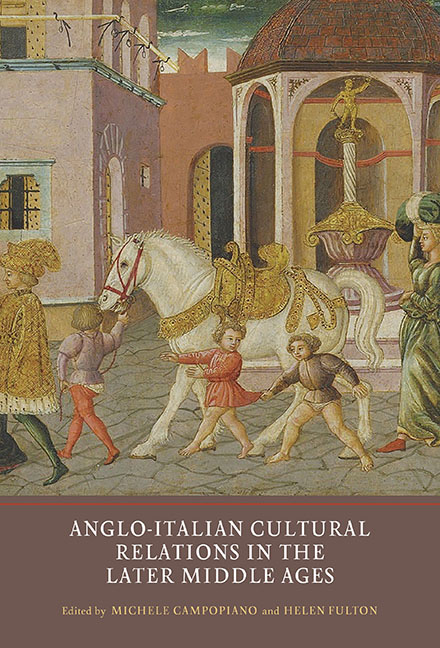Book contents
- Frontmatter
- Contents
- List of Illustrations
- List of Contributors
- Acknowledgements
- List of Abbreviations
- Introduction: Historical and Literary Connections between Britain and Italy in the Middle Ages
- 1 Writing, Translating and Imagining Italy in the Polychronicon
- 2 Richard de Bury, Petrarch and Avignon
- 3 The Reception of Italian Political Theory in Northern England: Bartolus of Saxoferrato and Giles of Rome in York
- 4 Italian Firms in Late Medieval England and their Bankruptcy: Re-reading an Old History of Financial Crisis
- 5 ‘Nostri Fratelli da Londra’: The Lucchese Community in Late Medieval England
- 6 ‘Saluti da Londra’: Italian Merchants in the City of London in the Late Fourteenth and Early Fifteenth Centuries
- 7 Political Joachism and the English Franciscans: The Rumour of Richard II's Return
- 8 Urban History in Medieval and Early Modern Britain: The Influence of Classical and Italian Models
- Afterword: The Nature of Anglo-Italian Cultural Exchanges
- Bibliography
- Index
Afterword: The Nature of Anglo-Italian Cultural Exchanges
Published online by Cambridge University Press: 03 July 2019
- Frontmatter
- Contents
- List of Illustrations
- List of Contributors
- Acknowledgements
- List of Abbreviations
- Introduction: Historical and Literary Connections between Britain and Italy in the Middle Ages
- 1 Writing, Translating and Imagining Italy in the Polychronicon
- 2 Richard de Bury, Petrarch and Avignon
- 3 The Reception of Italian Political Theory in Northern England: Bartolus of Saxoferrato and Giles of Rome in York
- 4 Italian Firms in Late Medieval England and their Bankruptcy: Re-reading an Old History of Financial Crisis
- 5 ‘Nostri Fratelli da Londra’: The Lucchese Community in Late Medieval England
- 6 ‘Saluti da Londra’: Italian Merchants in the City of London in the Late Fourteenth and Early Fifteenth Centuries
- 7 Political Joachism and the English Franciscans: The Rumour of Richard II's Return
- 8 Urban History in Medieval and Early Modern Britain: The Influence of Classical and Italian Models
- Afterword: The Nature of Anglo-Italian Cultural Exchanges
- Bibliography
- Index
Summary
The contributors and editors started out with particular ambitions for this book: to extend existing debates about Anglo-Italian cultural relations in the Middle Ages; to cover as wide a range of disciplinary interests as possible; and to encourage further conversations about the significance of cultural exchanges between Britain and Italy before the age of the Grand Tour.
We hope that the book achieves these aims and goes some way towards establishing a new approach to the study of cultural exchange. In every chapter, it is the lived experience of individuals, substantiated by written evidence, that shapes our collective understanding of how different cultures interact with each other. From Margaret Bridges's map-makers and my own survey of urban historians to Italian merchants and bankers in London (Helen Bradley, Bart Lambert, Ignazio Del Punta), from Victoria Flood's Franciscans to owners of manuscripts (Carolyn Collette and Michele Campopiano), the processes of cultural interaction, subtle as they are and often evident only in hindsight, are shown to take place at the level of human experience.
This is not to say that we take a simplistic liberal-humanist view of the individual as the source of human agency and social change. Each chapter of the book locates individuals not so much as products of ‘society’ at large, and certainly not as essentialist already-formed individuals, but as the constructs of particular discursive communities. It is in these communities that cultural exchanges are most likely to take place. Carolyn Collette writes about Richard de Bury as a book collector interacting with other book collectors, notably Petrarch and the royal court. Helen Bradley describes the Italian community living in London and their interactions with the locals while, like many modern migrants, maintaining a sense of their own identity as Italians. Ignazio Del Punta uses the discourse of economics to construct a community of Italian bankers in England and their relations with the Crown. Victoria Flood focuses on the Franciscan community and their uses of the discourse of prophecy to support their worldview. Cultural interaction, then, is here re-theorized as the sharing, exchange, and assimilation of ideologically meaningful discourses.
Another way in which this book moves the conversation forward is by its focus on material and intellectual activities other than humanism.
- Type
- Chapter
- Information
- Anglo-Italian Cultural Relations in the Later Middle Ages , pp. 179 - 181Publisher: Boydell & BrewerPrint publication year: 2018

